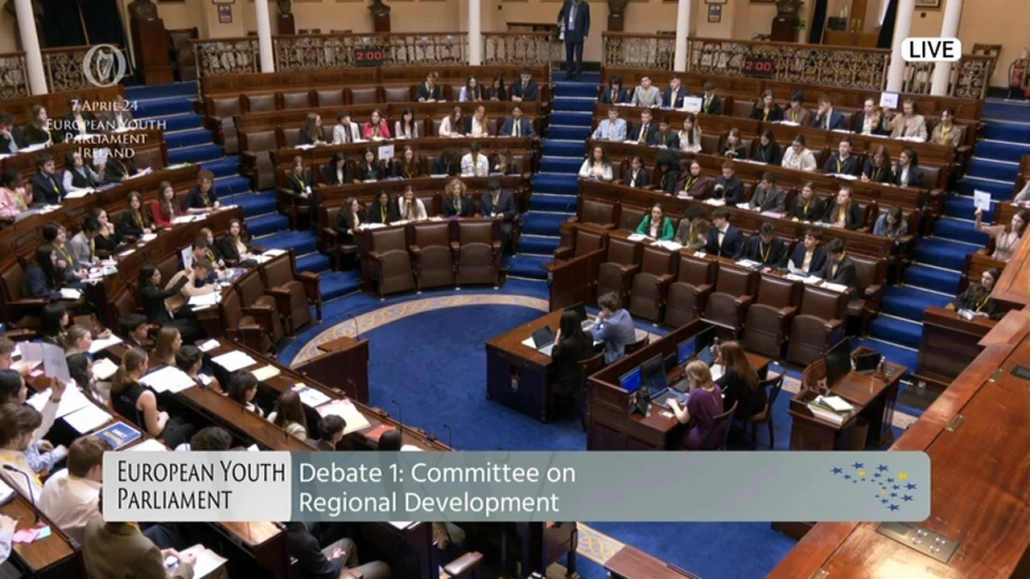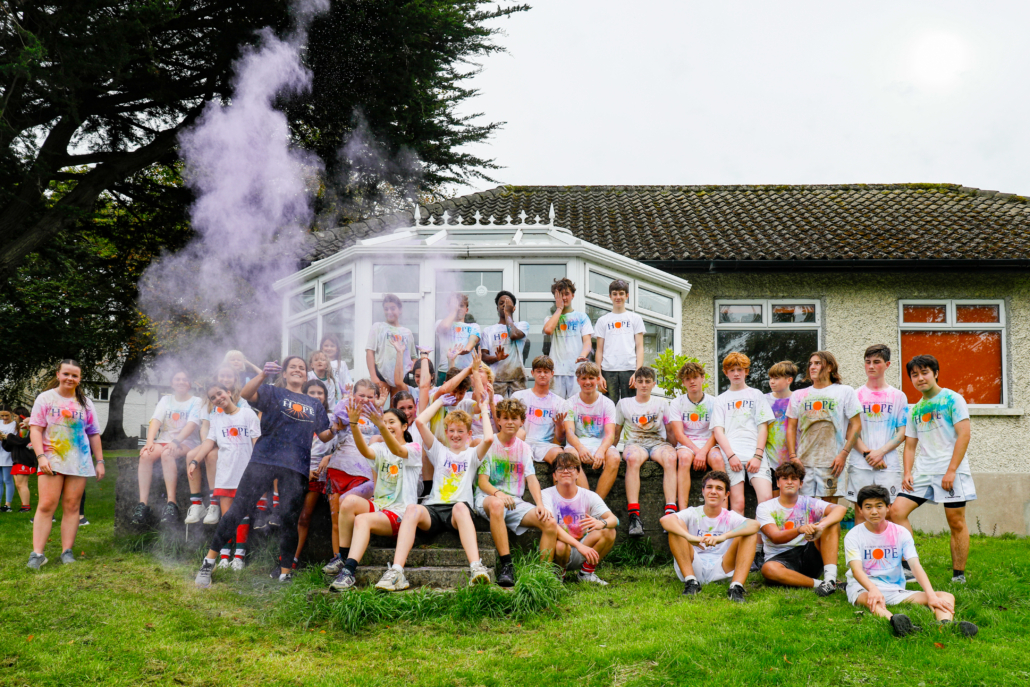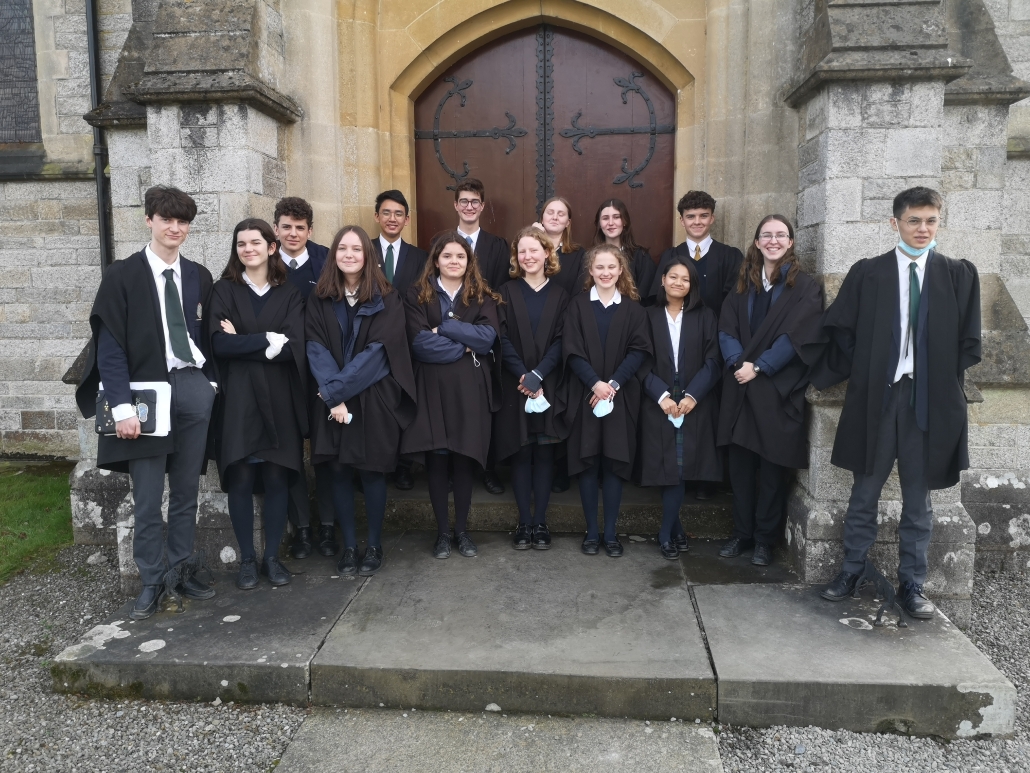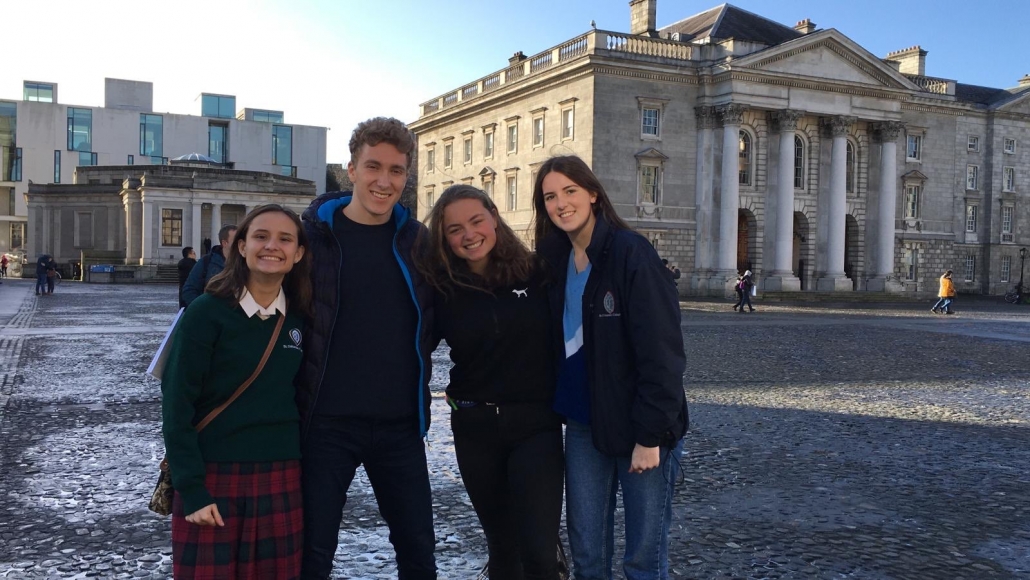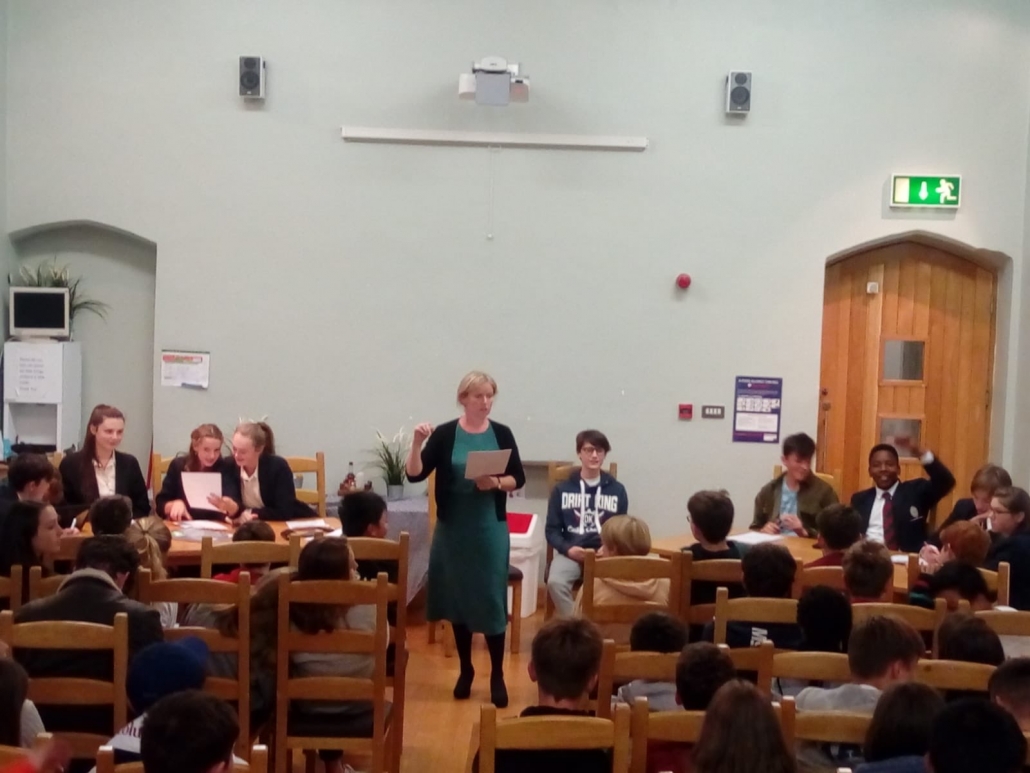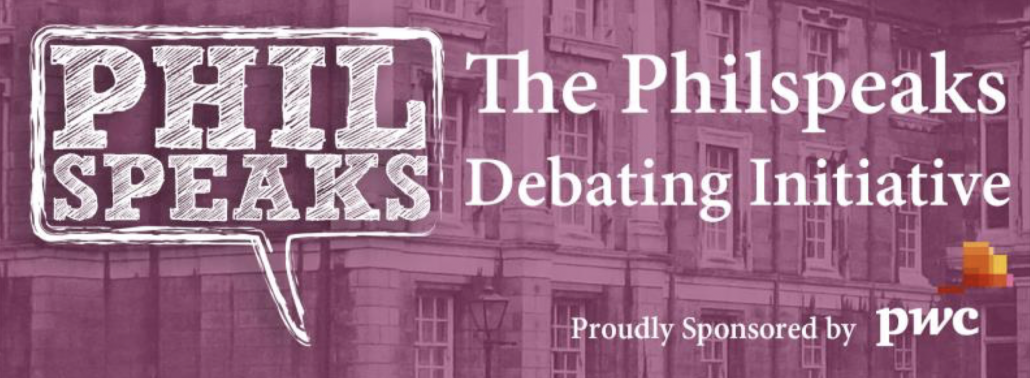Harry Williams, Form V, writes on his recent experience taking part in the European Youth Parliament.
From April 3rd to the 8th I was invited to a European Youth Parliament National Session which took place between Cork and Dublin, concluding with a general assembly in the Dáil Éireann. I was in Dunmore East at the time meaning my dad had the pleasure of driving me about two hours to Cork for the registration and first day. After saying goodbye I made my way to the table at the back of Cork College FET, filled with faces that I’d soon come to know and, after a few technical difficulties, I was up and running with my very own lanyard and committee that I would soon be a part of. Since I was there by myself and didn’t really see anybody I could recognize from the regional session I had done a few months prior, I was slightly by myself. There were kids milling about the large conference room, laughing and chatting amongst themselves. They all seemed quite content in their little circles of comfort, so I decided to put on my big boy boots and walked towards the nearest group of people and introduced myself.
I was terrified as I walked up, since you always expect a bit of shunning or some sort when meeting new children your age but, to no one’s surprise, everybody was extremely welcoming and considerate. Turns out there were a couple faces I could recognise from the Dublin session and after reintroducing ourselves (and, at the time, me remembering none of their names) we got to reminiscing on the whimsical things we took part in at the regionals. Remembering this helped a lot with reconnecting, and so did the absolutely amazing lunch of a cold service station sandwich they gave us. I would become very familiar with these in the coming days of the event.
After everybody registered they began with the introductions of the organisers of the event and ”energisers”. For those in the dark an “energiser” is just about the most mortifying thing you can think of doing as a cool and mysterious teenager, group singing and dancing. Typically an organiser will get into the middle of a large circle of adolescents and start singing a “sing after me song” in which the rest of the room copies what the organiser is doing/saying. After a couple of excruciating and also weirdly fun minutes, we assembled into our committees with our chairpersons making their own introductions. The chairperson is similar to that of the mom/dad of the group who is a couple years older and supervises the committee so we actually get stuff done. Then we moved upstairs and got to getting to know each other by playing name games, dancing, and debating morality and guilt.
Following this, we had some tea and biscuit (we were only allowed one) and went back to playing catch with the speaking ball or guessing which instrument the person next to us is likely to play. Once the group had decided I was a tin whistler, we had dinner (a slice of vaguely stale lasagna) and transferred over to our hostel for the next four days. After unpacking and meeting the roommates, I went down and began the nightly ritual of playing a game of cards with way too many people, putting a couple cards into my pockets, winning, and then heading to bed just as I was going to lose. The next day we continued with the team building, this time with competitions between committees.
After dominating every other group, we started thinking about ideas for our resolution. The committee I was on was called TRAN, or the Committee for Transport and Tourism. Our proposing question was “In light of the 2050 EU carbon target, how should the EU further improve the sustainability of domestic and international transportation?” As riveting as it may sound, for me it was actually my first choice. So I was happy to waffle on as much as possible about high-speed rails and how planes and rich people are bad. The following two days were spent on what was called “committee work”. In normal terms, a bunch of kids get together and try their best to come up with a solution to a major EU wide problem. It actually went quite smoothly, bar a few hiccups about monopolies and world domination.
Once we had finished with all of this committee work we were given a day’s break to go to Fotá, Ireland’s premier wildlife picture taking area. However the organizers of the event seemed to have forgotten that it was April in Ireland so Fotá, Ireland’s premier wildlife picture taking area, was closed due to storms. As such the organizers brought us to the next best thing, Kung-Fu Panda 4. After a mid-tier Kung-Fu Panda movie, we made the transfer to Dublin and had some delicious lunch (cold service station sandwiches). We unpacked our bags in a newer and nicer hostel and headed downstairs for more music and card games. That night every committee’s resolution was released for all of the other committees to critique and tear apart. This led to a few dorm wars but thankfully only a few lives were lost.
The next morning was a great healthy start with one apple for breakfast and the hope that I could make it the next 4 hours without eating anything. We made the ten minute bus ride to the Dáil Éireann and got our very own passes and metal detector tests before heading in. The chamber was exactly like on TV, but in real life. The whole situation didn’t quite feel serious until the speaker of the Dáil came and gave us a talk. At which point I began to understand that I was, in fact, sitting in the seat of major politicians in Ireland. After the Lord Mayor of Dublin spoke next, we began the General Assembly. This was a process in which one committee would give an opening speech, then there would be two position speeches (speeches given by opposing or agreeing committees), followed by three rounds of open debate.
These rounds of open debate would start by the jury calling on around six points of interest from opposing committees and then after which the proposing committee would respond as best they could. Once these debates were finished, there was a closing speech and then all of the committees would vote on the motion and whether it should pass. Once the votes were tallied, and the resolution passed or failed, the whole process was restarted. On the first day, there were three committees before lunch, two after, and then a coffee break. After the coffee break (still one biscuit) we began the final two. We finished around four o’ clock after which we went back to the hostel to enjoy more live music and dancing and cards. The final day we had three committees before lunch and then the final committee proposing after lunch. TRAN (my committee) was third on the second day, so I had plenty of time to tear out my hair over every single word on our resolution in an attempt to predict what people would criticize. Of course, I wasn’t even close to any of them but at least I felt like I was doing something. When our committee was proposing the time went by a little too quickly in the run up to my turn. I was responding to the second round of open debate which was stressful enough, but the whole operation being televised and having every team member throwing sticky notes with valuable information on them at me didn’t help. But I managed to get through it without making a complete fool of myself which I was quite happy with. On top of that I managed to tear down another committees’ resolution as they had forgotten to include a way to solve one major issue that they had mentioned in their very own resolution. So if that’s not indicative of a great time I don’t know what is.
Our ending ceremony was emotional as the organizers had spent the last 9 months doing what their names suggest, so their attachment was definitely reasonable and if I was in their position I probably would’ve shed a few tears as well. After the closing, we got a goodie bag from the government and after a few photos, exchanging numbers, and collecting bags, I said my goodbyes and headed back to school. The whole ordeal left me quite exhausted but also very satisfied. There is something very special about the EYP program. It teaches you how to become fast friends, as well as slight enemies. The competition was good-spirited and at the end of the day we were all just happy to have done it. I would highly highly recommend the whole thing to anyone who is even moderately interested in not politics, but making a small change.
An interesting story I heard about during the session was that one of the resolutions that got turned down in a previous national session was then redone in an international session. This was passed in the international session, which led to a committee in the actual European Parliament proposing a real proposition that was noticeably similar to the international sessions, and it then getting passed. So if you ever feel as though nothing you do actually impacts those around you, maybe reconsider. It could be that by doing one of the silly little regional sessions you’ll find that tearing apart other people’s ideas while giving no solution in the meanwhile is actually very very fun.

